Human Rights Violations
in Kashmir
The Kashmir Valley is in
grip of terrorist trauma engineered by Pakistan. In fact, it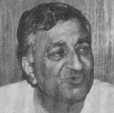  is
a low cost proxy war declared by Pakistan against India to grab Kashmir.
The grimmest fallout of this atrocious Pak operation is the total exodus of the
Hindu minority from Kashmir Valley. It has threatened the unity of India and the
very survival of Kashmiri Hindu minority. They have been uprooted from Kashmir
Valley. The future is bleak and their existence is in danger. The following
census figures speak volumes: is
a low cost proxy war declared by Pakistan against India to grab Kashmir.
The grimmest fallout of this atrocious Pak operation is the total exodus of the
Hindu minority from Kashmir Valley. It has threatened the unity of India and the
very survival of Kashmiri Hindu minority. They have been uprooted from Kashmir
Valley. The future is bleak and their existence is in danger. The following
census figures speak volumes:
| Year |
Muslims |
Hindus |
Others |
| 1941 |
83% |
15% |
2% |
| 1981 |
92% |
5% |
3% |
| 1991 |
97% |
0.1 % |
2.9% |
At present over 300,000 of them (about 78,000
families) are either residing in temporary relief camps at Jammu, Delhi,
Chandigarh or Amritsar or have made their own arrangements in various parts
of India. This figure of over 300,000 excludes over 10000 Muslims, who
also have been forced by the denial of free expression and circumstances
to leave the Valley of Kashmir to seek refuge in India.
PREFACE
We hold no brief for any one violating human rights
anywhere. All we submit is that the small and helpless community of Kashmiri
Pandits, along with Kashmiris of other communities suffering for their
belief in secularism, nationalism and democracy, are the worst victims
of human rights violations in Kashmir. They continue to suffer the aftermath
of this tragedy, living a miserable life i n townships of tattered tents,
and other camps, in Jammu and other parts of the country. But nobody hears
their anguished cry while the terrorists, their supporters in the state
and Pakistan have succeeded in generating worldwide awareness about the
hardship faced by some Muslims in Kashmir for harboring and helping terrorists.
Organizations like the Amnesty International and Asia Watch while raising
howls about the difficulties of Kashmiri Muslims make no more than passing
references to the inhuman brutality with which the Muslim terrorists in
the state massacred large numbers of Kashmiri Hindus and indulged in rape,
arson and plunder forcing them to flee their homes of hundreds of years.
The latest incident is the shooting down of a hundred year old Kashmiri
Pandit in Wanpora in the first week of June, 1993. All this is sought to
be hidden behind the smoke screen of "human rights violations by the security
forces" and basic questions are clouded in a desperate attempt to keep
the world in dark about the actual happenings in the name of insurgency
against the Center.
It is therefore essential to make a proper assessment
of violations of, whose human rights in Jammu and Kashmir. While doing
so, facts must be treated as sacred and not twisted for dramatic effect
to serve sectarian political ends. Unfortunately, the assessments made
by some of the Human Rights organizations are faulted in their very fundamentals
because such assessments have been based on avowedly partisan evidence.
Most of the evidence has been collected in Pakistan-occupied part of the
Jammu and Kashmir State and from other sources close to the terrorists.
Some of these "watch dog" groups make little attempt to conceal the fact
that they are functioning as apologists for Muslim terrorists operating
in the State at the behest of Pakistan.
Nothing else can explain their studied indifference
to the plight of more than three lakh Hindus whose "rights", such as they
were in a regime which was already Islamic except in name, were trampled
under the jack-boots of the Pakistan-aided marauders in collaboration with
local Muslim fundamentalist and secessionist elements. The magnitude of
misdeeds of the terrorists have been of such proportions that Asia Watch
found it difficult to completely conceal them and had grudgingly to concede
that they were guilty of excesses in the name of violent opposition. It
is a tragedy that even after the Asia Watch report was made public certain
people in this country fell prey to the Pakistani and terrorist disinformation
and have developed a mind-set totally indifferent to the plight of Kashmiri
Hindus who have been reduced to beggary in their own country for their
patriotism, tolerance and secular ideals. The flood of publicity mounted
by the mentors submerged the sad tale of their suffering, so much so that
when the specter of "demographic change" was recently raised, nobody asked:
Has demographic change not already been brought about in the state? Has
it not been made a totally Muslim Kashmir now with the elimination of the
Pandits?
Design To Break Up India
Terrorism is a violation of human rights, whatever
its political objectives. Terrorism in Jammu and Kashmir motivated by ideological
commitments to a Muslim crusade is a greater violation of human rights.
The Universal Declaration of Human Rights, it must not be forgotten, was
adopted by the world community precisely to save mankind from the scourge
of crusades; the second world war was a war of crusades.
There is an imperative necessity for a bold and
unconventional endeavor to identify the content and contours of violence
which has ravaged Jammu and Kashmir State and describe the perspectives
in which the infringements of human rights deserve to be assessed. Any
enquiry and assessment restricted to parameters predetermined by political
considerations and social motivations and preconceived notions of the nature
of the violence and strife in the state, is bound to be self-defeating.
Human judgments which are presumed to be universal, as the Universal Declaration
of Human Rights, underline generally accepted norms and standards of human
behavior and not such norms and standards which are arbitrarily devised.
There is always a danger in shifting parameters and judgments in respect
of human rights because shifting parameters and judgments are incompatible
with and destructive of the universality of such rights.
It will be a travesty of human history to ignore
the crucial factor of terrorist violence in Kashmir which must ultimately
determine the context in which the violation of human rights has taken
place. The boundaries of state action to contain terrorism must be viewed
in the broad context of the United Nations Charter, the International Covenants
and the resolutions of the General Assembly and the Security Council on
terrorism. An enquiry into human rights violations in Jammu and Kashmir
cannot be confined to narrowly local and narrowly dated frames of reference.
The terrorist violence unleashed in Jammu and
Kashmir by various terrorist organizations and the state of Pakistan, Is
by itself a violation of human rights. The Muslim crusade which seeks to
exterminate the religious and ethnic minorities In Jammu and Kashmir and
establish the primacy of Islam in the government and the society of the
state, contravenes the principle of the due process of law which is the
basis of the Universal Declaration of Human Rights. Political terrorism,
whatever its Ideology and objectives, is a crime against International
Law, a crime against humanity, a crime against the law of war and a crime
against the Universal Declaration of Human Rights.
Terrorist violence in Jammu and Kashmir has several
dimensions which have a direct bearing on human rights in the state.
In the first place, terrorism in Jammu and Kashmir
is a process of political violence which has specified political commitments
aimed to separate Jammu and Kashmir state from India and secure its annexation
to Pakistan. It is the culmination of the Muslim struggle in pre-partition
India for the homeland of Pakistan, which claimed Jammu and Kashmir on
account of the Muslim majority character of its population. It is a religious
crusade to complete the partition of India which it is claimed is 'incomplete'
so long as Jammu and Kashmir is not merged with Pakistan. It must clearly
be understood that this terrorist violence is not aimed at effecting any
change in the existing political system, economic organization or social
relationships. It is neither an expression of political dissent, nor is
it apolitical movement aimed to replace the existing sets of political
instruments in the state. It has an international content as it is aimed
at cutting off a part of the Indian nation and secure its annexation to
the state of Pakistan.
The Muslims in Kashmir are the ruling elite of
the state. They dominate its entire economic organization and enjoy communal
precedence in all social forums. Islam is virtually the official religion
of the state. Whereas the Muslims constitute a little more than half the
population of the State, they possess three-fourths share In legislative
bodies, administrative organizations and all the local Government Institutions.
In the Kashmir province, the Hindus have no elected representation In the
State Legislature, nor do they have any elected representation in the local
bodies. They constitute less than five per cent of the administrative services
of the State and have less than one percent share In the higher cadres
of the state administration. Muslims monopolize 94 per cent of the state
services In Kashmir. The Hindus of Kashmir province have absolutely no
share In the decision making clusters of the state Government, which have
always been constituted by the Muslims of the Kashmir Province. More than
90 per cent of the admissions to professional, technical and other educational
Institutions are reserved for Muslims in one form or the other purely on
communal basis. The Hindus, Sikhs and other minorities share a bare 8 per
cent of the educational facilities that the State provides.
The Muslims own and control the entire economic
and Industrial structure of the Kashmir Province. They own 96 per cent
of the agricultural land, orchards and other urban landed estates. They
enjoy a monopoly over the entire industrial organization, trade, commerce,
financial resources and exports of the province of Kashmir. They have complete
monopoly in trading in fruits, carpets, shawls, wood-work, woolens, silk
etc. The Hindus in Kashmir have never been allowed to have any share In
the tourist industry, the transport organization, concessionary contracts
for the construction of the State property, roads and buildings and the
licenses for Imports and exports which the state Government has been lavishly
distributing among the Muslims.
Evidently, terrorist violence in the State is
not local in content or outlook. Its objectives have transnational implications
and its aim is the separation of Jammu and Kashmir State from India and,
as a consequence, open the way for the disintegration of the Indian Union.
Violation of Human Rights
The political content of the terrorist violence
has a direct effect on human rights as it involves militants' strategies
which cannot but infringe the principles which form the basis of human
rights. These strategies include:
1. Liquidation of the Indian support
structures in the state, involving elimination of the people of all communities
including Muslims who constitute such support structures;
2. suppression of all political dissent and opposition
by fear,
3. oppression and mental torture of people who
do not support terrorism;
4. liquidation of civil population which extends
help to security forces in their operations against terrorists;
5. communalization of the society aimed to suppress
opinion opposed to the secession of the state;
6 . conduct of military operations by the terrorists
against the security forces of the state in violation of the laws of war.
The second major dimension of terrorism in Jammu
and Kashmir is the terrorists' aim to exterminate Hindu population in the
Kashmir valley because Hindus do not accept the secession of the state
from India and its annexation to Pakistan nor do they accept to be governed
by the authority which derives its sanction from the law and precedent
of Islam. The Hindus have always supported accession of the state to India.
They have, undeniably, formed the most powerful support base for India
in Kashmir. Hindus in the valley rose unitedly against the invasion of
the state in 1947, and fought shoulder to shoulder with the Indian soldiers
against the infiltrators from Pakistan in 1965. They were always in the
forefront of the struggle against secessionism, communalism, fundamentalism
and the various movements for annexation of the state to Pakistan.
In the present turmoil the strategies used in
the terrorist operations against the Hindus in Kashmir include:
1. The extermination of Hindus;
2. Subjection of Hindus to brutal torture to instill
fear among them in order to achieve their submission to the terrorists
and their exodus from Kashmir;
3. Flushing out such Hindus who refuse to submit
to the terrorist dictates, by force, fear of death, fear of conversion
and criminal assault on their women;
4. Destruction of the residential houses of the
Hindus Who migrate and the appropriation of their business establishments
to ensure that they do not return;
5. Attachment of their landed property;
6. Destruction of the social base of the Hindus
by desecration and destruction of their places of worship, shrines and
temples;
7. Appropriation of the property of the Hindu
shrines and its attachment to the Muslim religious endowments;
8. Declaration of a religious crusade against
the Hindus.
Pakistan Factor
The third and the most crucial aspect of terrorism
in the State is the participation of Pakistan in the terrorist violence.
Pakistan has a history of sponsoring terrorist violence in its neighboring
countries including India. It is openly committed to the export of Islamic
revolution to non-Muslim states and militarization of pan-Islamic fundamentalism
in South Asia. Pakistan has always used Islam as an ideological instrument
for its territorial expansion. It has claimed Kashmir in the name of the
Muslim nation and the unity of the Muslims Ummah. Pakistan is at present
a conventional, organized and international base for the militarization
of pan-Islamic fundamentalism and Muslim terrorism in Asia. There is enough
proof of the complicity of Pakistan in the terrorist activity in Jammu
and Kashmir, which cannot be disregarded.
The induction of terrorism in Jammu and Kashmir
by Pakistan is its third attempt to cut off Jammu and Kashmir from India
and annex it to its territories. In October 1947, Pakistan sent thousands
of armed forces and irregular commandos into the State to annex it. Were
it not for the heroic resistance of the state troops led by the Chief of
the Army Staff of the State, Brigadier Rajender Singh, who resisted the
advance of invading forces till the State acceded to India and the Indian
troops joined the battle, the story of the State would have been different.
About thirty thousand Hindus and Sikhs were slaughtered by the invading
hordes in the territories of the State overrun b them. Hundreds of thousands
of them were uprooted and displaced. That story is still untold. In 1965,
Pakistan inducted thousands of its trained commandos in the garb of local
Muslims into the State to unleash a Muslim rebellion against India. The
infiltrators spread all over the valley, penetrated into Srinagar. but
due to the lack of support from local Muslim population and prompt military
action taken by Government of India, the infiltrators sneaked back to Pakistan
after war broke out between the two countries.
The present terrorist violence in Jammu and Kashmir
is the third attempt by Pakistan to break up India and annex Jammu and
Kashmir. This time the technique of military intervention is different;
the flanks of terrorist organizations are recruited from the local Muslim
population and after being trained and armed in Pakistan are reinducted
into the State, to carry on the Islamic crusade, Jihad, against India.
Large numbers of armed commandos consisting of personnel of the army and
intelligence services of Pakistan, and the various troop formations raised
in the occupied territories of so-called Azad Kashmir have also been inducted
into the State to help the terrorist elements.
The consolidation of the pan-Islamic fundamentalism
and its militarization in South Asia has been effectively used by Pakistan
to export Islamic revolution' to Jammu and Kashmir. Once the Jihad or the
Islamic crusade for the liberation of the State triumphs, Jammu and Kashmir
will as a part of the fundamental unity of the Muslims, join the Muslim
nation of Pakistan. That is the reason why Pakistan projected Jammu and
Kashmir Liberation Front in the first phase of terrorism in Kashmir, ostensibly
to create an impression that the Muslims have launched an armed struggle
in the State to liberate it from India. The truth is that Jammu and Kashmir
Liberation Front was sponsored by Pakistan to impart a more militant direction
to demand for plebiscite in the State. It received arms and funds from
intelligence agencies of Pakistan and always acted under the instructions
of the intelligence services of that country. Once the terrorist violence
in the state spread, Pakistan inducted the more powerful terrorist flanks
into the state, like the Hizbul Mujahidin, the militant outfit of
Jamaat-i-Islami,
Al Badar, exclusively entrusted with the task of liquidating the Hindus,
and the other terrorist organizations like Al Umar, Allah Tigers, Janbaz
Force, Hizb Ullah and several other terrorist groups all committed to the
accession of the state to Pakistan.
Mass Massacres
The terrorist violence in Kashmir has involved
mass massacre of the people of the State, destruction of their property
and genocide of Hindus and their exodus from Kashmir. The death and destruction
of innocent people, genocide of minorities and conduct of a war of attrition
in violation of the laws of war are crimes against humanity and international
law, besides being violation of human rights. The terrorist violence in
Jammu and Kashmir, on a well designed pattern, has led to several consequences
which are inextricably interlinked with the violation of human rights.
The pattern in which terrorism has manifested itself in Jammu and Kashmir
has several aspects, some of which are characteristically original to the
political violence unleashed by the various terrorist organizations and
Pakistan in Jammu and Kashmir. These aspects are
(a) mass massacre;
(b) genocide of Hindus and
(c) atrocities committed by terrorists.
It is generally presumed that mass massacre involves
a hundred or more political killings. Mass murder is not a precise term.
It is arbitrarily defined here as something approaching "a hundred or more
political deaths". In Jammu and Kashmir terrorism has involved the liquidation
of thousands of people, including the Hindus, the Muslims, the security
personnel and the strategic staff of the State government and other administrative
bodies. A computation of the data on the terrorist killings from the local
newspapers published from Srinagar and other townships in Kashmir reveals
that the number of the people, other than Hindus, killed by the terrorists,
runs into several thousand.
The main targets of terrorist violence in Kashmir,
have been
1. the Hindus;
2. the Muslims opposed to secession, the Muslims
accused by terrorists of acting as "agents of India" and "informers" and
those alleged to have spied for the security forces of the state;
3. Hindu employees of the State government, the
Hindu employees of the government of India posted in the State, Hindu technical
staff of Government of India installations of communications, police, radio
and television, Hindu technical staff of the industrial corporations and
the Hindu personnel of the security organizations of the state as well
as the personnel of the Central paramilitary forces deployed in the State.
The Hindus of Kashmir, among them mainly the Kashmiri
Pandits, have been killed in large numbers irrespective of their age, profession
and political commitments. The killing of Muslims has been specifically
selective and except for a few doubtful cases most of the Muslims killed
have been those who have been opposed to secession and who did not support
Pakistan's claim to Jammu and Kashmir State. More notable of the Muslims
who have been assassinated by terrorists include Maulana Masoodi, a veteran
freedom fighter and a close associate of Sheikh Mohammad Abdullah; Maulvi Farooq, Mirwaiz of Kashmir; Mir Mustafa, a former member of state Legislature;
Pir Hissam-ud-Din Bandey and Abdul Jabbar, former ministers of the State
government; Abdul Sattar, Ranjoor, General Secretary of the Communist Party
of India in the State; Mohd. Shaban, Editor, Al Safa, an Urdu daily; Prof.
Mushir-ul-Haq, Vice-Chancellor of Kashmir University; and
Mohd. Din Bandey,
the Muslim Gujjar who reportedly gave the first information about the ingress
of infiltrators from Pakistan in 1965. Among the many other Muslims killed
by the terrorists are former members of the State Legislature, National
Conference and Indian National Congress activists, and officers of the
State police.
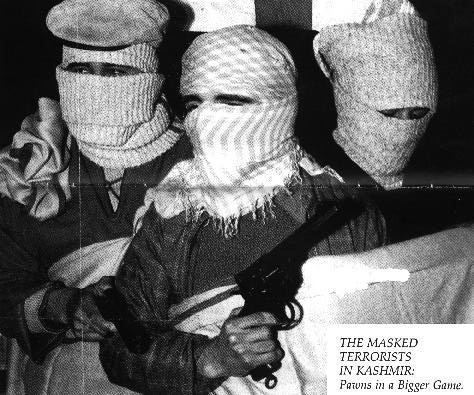
The masked terrorists in Kashmir: Pawns in
a bigger game.
Terrorism has taken a very heavy toll of the personnel
of the security organizations of the State. Barring variations in official
account of the security personnel killed and the account given by the local
press as well as the figures made public by the terrorists themselves,
a fairly large numbers of the personnel of the para-military forces and
the Indian army have been killed in the hit and run guerrilla attacks mounted
on them by terrorists. The attacks have involved sudden assaults on para-military
pickets in civil areas, ambush of army and para-military convoys, mine
blasts, rocket and bomb blasts on police stations and other security installations.
Genocide Of Hindus
Genocide is the destruction in whole or in part
of a national, ethnic, racial or religious group. The United Nations General
Assembly approved a resolution on 11th December, 1946, declaring genocide
a crime under International Law. A convention on the Prevention and Punishment
of Genocide adopted by the General Assembly came into effect on 12th January,
1951. The Convention proclaims genocide as a crime against International
Law. The Convention lists destruction of an ethnic, racial or religious
group as genocide. Specifically, genocide includes:
1. Killing members of a community or
a group because of their affiliations;
2. Causing bodily or mental harm to the members
of a community or a group;
3. Deliberately inflicting conditions on the community
or the group to bring about its physical destruction;
4. Imposing measures to prevent births in the
community or the group;
5. Forcibly transferring children from one group
to another.
The terrorist organizations in the State and those
operating from Pakistan have unleashed an organized campaign to exterminate
the Hindus in Kashmir. Besides the obligation to prosecute a religious
war against them, terrorists have sought to achieve several tactical advantages
in eliminating Hindus. Hindus used to form a vital and powerful base for
India in Kashmir. They have fought the secessionist movements in the State
with their bare teeth. They alone have resisted the onslaught of the pan-Islamic
fundamentalism as well as the Islamization of the Government and the society
in the State. They have always been instrumental in keeping the feedback
channels of Government of India open and maintaining a regular and uninterrupted
flow of information to its agencies.
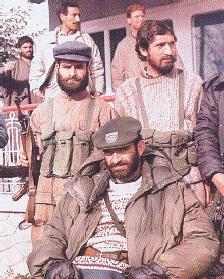
Terrorist leader with bodyguards.
The mass attack on the Hindus began in January,
1990, and by the onset of August, 1990 more than eight hundred of them
had been murdered in cold blood. Most of the victims were innocent people
who lived in poverty and persecution under the Muslim dominated constitutional
organization of the State. Among those killed, were people from all sections
of the society, lawyers, political activists, mediamen, intellectuals,
shopkeepers, errand boys and men of small means.
The terrorists killings have been accompanied
by torture unheard of in the annals of human history, which tantamount
to grave crimes against all law and against humanity. In sheer disregard
of the norms of political behavior, generally recognized by civilized nations
and now embodied in several international Covenants, the charter of Human
Rights Declaration and resolutions of the United Nations General Assembly,
the terrorists have inflicted grievous hurt, injury and death / torture
on hundreds of Hindus and other dissenters. Torture deaths have been brought
about by inhuman practices described below:
1. Strangulation by using steel wires;
2. Hanging;
3. Impaling;
4. Branding with red hot irons,
5. Burning alive;
6. Lynching;
7. Draining of blood in contrived terrorist underground
hospitals;
8. Gouging of eyes before assassination;
9. Slicing;
10. Dismemberment of body;
11. Breaking of limbs;
12. Drowning alive;
13. Dragging to death;
14. Slaughter.
Brij Nath Shah was kidnapped on 27th April, 1990
from his home at Sadhu Ganga, Kupwara in Kashmir. Two days later his body
was found hanging by a tree. His lips had been stitched.
Sham Lal of Chiragam in Anantnag, Kashmir was
kidnapped in May 1990. The hands and the feet of the unfortunate man were
chopped off and his skull battered. Sham Lal's dead body was stuffed in
a sack and left on the threshold of his house, wherefrom it was recovered
by his brother.
 

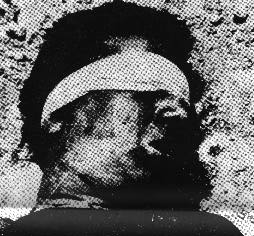
Innocent victims of Pakistan's Terrorism.
Pran Nath of Uttarsu in Anantnag District was
kidnapped on 27th May, 1990. His body was found impaled; his chest and
feet nailed.
Three officials of the Life Insurance Corporation
of India were kidnapped in Srinagar. They were subjected to torture and
then confined in an abandoned Kashmiri Hindu migrant house. The house was
set ablaze. Two of the officials were burnt alive while the third official
escaped with more than 50 percent burns.
One Bhushan Lal of Ompura in Badgam, Kashmir was
kidnapped on 27th April 1990. He was tortured and then strangulated to
death. His body was found the next day.
Girja, a school teacher at Bandipora, was kidnapped
from the house of a Muslim colleague. The unfortunate woman, after being
gangraped, was sliced on a mechanical saw.
Scores of the bodies of Hindus were recovered
from River Jhelum. Most of them were drowned.
Brij Nath Koul of Hermani of Shopian, an employee
of the Agricultural Department and his wife were tied to a speeding vehicle.
Their mangled bodies were recovered ten kilometers away from their home.
The dead bodies of several Kashmiri Hindus were
salvaged from various places in Kashmir. Their heads had been severed off.
Several dead bodies of Kashmiri Hindus were recovered,
which had been branded by hot irons before death. Several bodies were found
with eyes gouged out.
The most dastardly and inhuman acts of terrorism
were those committed in the hospitals where the Hindus brought in for treatment
were either allowed to die for want of treatment or brutally murdered by
the doctors and others who collaborated with the terrorists. A number of
cases have been reported where injured Hindus were allowed to bleed to
death.
Scores of cases have been reported where kidnapped
Hindus were drained of their blood and their lives were terminated.
Among the dead in Kashmir, the state Government
is yet to disclose the identity of about four hundred dead bodies, recovered
by the police and disposed of at its will. The State government is keen
to cover the anti-Hindu character of the terrorist violence and has tried
to play down the massacre of Hindus. But the fact remains that most of
those killed and still unidentified are Hindus. A survey of the migrant
population reveals that there are several hundred Kashmiri Pandits, who
are missing and are presumed dead.
The worst sacrilege to which the Hindus have been
subjected, and the process continues still, is that the kith and kin of
the Hindus killed in Kashmir, were not allowed to carry the dead bodies
to Jammu for cremation according to Hindu rites. Evidently, the cremation
of Hindus in Kashmir could not be carried out according to Hindu rites
because the terrorists forbade Hindus to accompany the dead to perform
their last rites. The Hindus' dead bodies were actually disposed of by
the State police on their own and in total disregard to the injury and
hurt the cremation of the dead bodies by the state police, caused to the
religious feelings of the bereaved Hindu families.
Exodus in Panic
The rising terror which consumed hundreds of innocent
Hindus, the deliberate indifference of the state apparatus infested by
pro-Pakistan agents and infiltrators and the failure of Government of India
to take effective and firm measures against the terrorists as well as their
harbourers, particularly in the ranks of the administrative organization
of the state, compelled the Hindus to flee for their lives to Jammu and
beyond. By July- September, 1990 more than two lakhs of Hindus had evacuated
from their homes leaving their property, land, trade and business behind
them. After the exodus, all the Hindu property has been looted and thousands
of Hindu houses burnt down. Several Hindu shrines have also been burnt
down or destroyed by explosives.
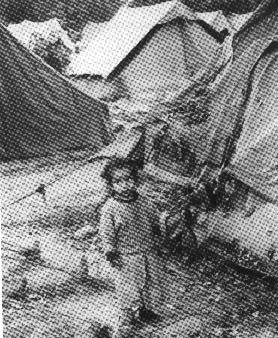
The refugee camps for Kashmiri Pandits at
Jammu.
Terrorism is a negation of life, and violation
of the norms of human behavior recognized by all civilized people of the
world. All value-based violence, which contravenes generally accepted norms
of social order, human behavior and right to life and equality of all men,
is retrogressive. Judgments which are based upon preferences which violate
life, equality of all men and freedom, do not have any revolutionary content.
The political violence motivated by ideological commitments whatever their
value- content is necessarily retrogressive. There is no freedom which
impinges upon freedom, no equality which upholds inequality. There is no
life which portends death. Political terrorism even if it is for a religious
crusade is as heinous a crime as any other crime against humanity. All
political terrorism is organized crime.
Terrorist violence cannot be justified on the
ground of its political and ideological motivations or value-basis. International
conventions and treaties, even those pertaining to human rights, do not
recognize terrorist violence as legitimate political action, arising out
of any ideological or political commitments or any value basis. Commitment
to separation of Jammu and Kashmir from India to further the cause of Islam
and in the name of Muslim unity and brotherhood, to ensure the Muslims
in the state the right to decide the future disposition of the state as
envisaged by the United Nations Resolutions; commitments to "complete the
partition of India" by the accession of the state to Pakistan or commitments
to liberate the Muslim majority state of Jammu and Kashmir from India or
commitment to establish a Muslim State of Jammu and Kashmir based upon
religious precept and precedence cannot legitimize and validate terrorism
in Kashmir.
International Law and Terrorism
There is a growing corpus of Municipal as well
as International Law and precedent to deal with politically motivated terrorism.
The civil jurisprudence and International law generally identify political
terrorism as a crime, more serious than traditional civil and international
crime. Murder of innocent people, torture deaths, kidnappings, abduction
and rape of women are heinous crimes which do not come within the traditional
definitions of crime. Many countries have extended their penal codes to
most terrorist offenses. Legislation has also been undertaken to provide
for special police powers and special judicial procedures to deal with
terrorist crime. New special anti-terrorist organizations have been created
within police departments and other international security organizations.
In many states military participation in police functions has increased.
Special military units for possible use in anti-terrorist operations have
been created in a number of countries. All these measures have been necessary
to combat terrorism and safeguard the lives of law-abiding citizens and
innocent people and save states from being broken up by sponsored terrorism.
Nations with long democratic traditions including the United States of
America, one of the foremost super-states supporting human rights, have
always demanded the adoption of severely stringent measures against political
terrorism.
It is relevant to note that the United State of
America proposed a set of highly stringent rules to deal with terrorism
in the draft of an International Convention submitted by the United States
Government to the ad-hoc committee of the United Nations on International
Terrorism in 1973. Understandably, most of the Muslim States disapproved
of the draft convention.
United Nations On Terrorism
The United Nations lists killings, kidnappings,
torture and abduction as a crime. According to resolutions of the General
Assembly of the United Nations on measures to prevent terrorism, the Nations
General Assembly:
1. Unequivocally condemns as criminal
all acts, methods and practices of terrorism wherever and by whoever committed
including those who jeopardize the friendly relations between states.
2. Deeply deplores the loss of innocent human
lives which results from such acts of terrorism.
3. Further deplores the pernicious impact of acts
of international terrorism on relations and cooperation among states including
cooperation for development.
4. Appeals to all states that have not yet done
so to consider becoming party to the existing international conventions
relating to various aspects of international terrorism.
5. Invites all states to take all appropriate
measures at the national level with a view to the speedy and final elimination
of the problem of international terrorism such as the harmonization of
domestic legislation with existing international conventions, the fulfillment
of assumed international obligations, and the prevention of the preparation
and organization in their respective territories of acts directed against
the states.
6. Calls upon all states to fulfill their obligations
under International Law to refrain from organizing, instigating, assisting
or participating in terrorist acts in other states, or acquiescing in activities
within their territory directed towards the commission of such acts.
7. Urges all states not to allow in any circumstances
to obstruct the application of appropriate law enforcement measures, provided
for in the relevant conventions to which they are party, to persons who
commit acts of international terrorism covered by those conventions.
8. Further urges all states to cooperate with
one another more closely, especially through the exchange of relevant information
concerning the prevention and combating of terrorism, apprehension and
prosecution or extradition of the perpetrators of such acts, or the incorporation
into appropriate bilateral treaties of special clauses, in particular regarding
the extradition or prosecution of terrorists.
The security Council adopted a resolution on 18th
December, 1985 urging upon all the States to undertake appropriate measures
to bring to an end hostage taking, abduction and other forms of terrorism.
In the operative part of the Resolution, the Security Council
1. condemned unequivocally all acts of
hostage-taking and abduction;
2. called for the immediate safe release of all
hostages and abducted persons wherever and by whoever they are being held;
3. affirmed the obligation of all States in whose
territory hostages or abducted persons are held, urgently to take all appropriate
measures to secure their safe release and to prevent the commission of
acts of hostage-taking and abduction in future;
4. urged the further development of international
cooperation among States in devising and adopting effective measures which
are in accordance with the rules of international law to facilitate the
prevention, prosecution and punishment of all acts of hostage-taking and
abducting as manifestation of international terrorism.
A number of other resolutions and conventions of
the United Nations General Assembly and the Security Council, the Adhoc
Committee on International Terrorism, various reports of the Secretary
General of the United Nations and the Covenants of various inter-state
organizations on political and international terrorism, have urged the
members of the international community to undertake stringent and effective
legal and administrative measures to combat terrorism. The recommendations
envisage the institution of fresh political instruments and modified penal
procedures to check terrorism. The Council of Europe produced a Convention
on terrorism in 1977, which stipulated that amnesty available to political
offenses should not apply to terrorist violence associated with all forms
of terrorist acts, assassinations, bomb outrages, rocket attacks and killings
by other explosive devices, kidnapping, taking of hostages, hijacking and
such other offenses.
Human Rights
In the Charter of the United Nations, the peoples
constituting the United Nations, express their determination to reaffirm
faith in fundamental human rights, in the dignity and worth of the human
person and in the equal rights of men and women and nations large and small.
In 1948, the General Assembly of the United Nations adopted the Universal
Declaration of Human Rights as a common standard of achievement for all
people and all nations. In 1966, it adopted the United Nations Covenant
of Human Rights.
The Universal Declaration of Human Rights stipulates,
in several sets of its articles, the inalienable rights of all members
of human family. These inalienable rights are grouped around six main principles-
Equality of man; Freedom of thought; expression and faith; Due process
of law; Freedom of peaceful assembly and association; Representative basis
of state power, and Right to a share in the social and economic organization
of the state.
The equality of man is fundamental to the Declaration
of Human Rights. The Declaration affirms that human rights are universal
and applicable without any discrimination. If all human beings, professing
different faiths, are born free with equal dignity and rights, no religious,
social or political injunction can impose a reservation on the equality
of man and discrimination against any people of the world. The equality
of man transcends all religious precepts and precedent, social sanction,
all ideological commitments and political limitations.
All human beings, the Declaration proclaims, are
born free and equal in dignity and rights. They are endowed with reason
and conscience and should act towards one another in a spirit of brotherhood.
All people are entitled to all rights and freedoms envisaged by the Declaration,
without any distinction of any kind, such as race, color, sex, language,
religion, political or other status. Every human being has right to life,
liberty and security of person. No one shall be subjected to torture or
cruel inhuman or degrading treatment or punishment. All people are equal
before law and are entitled without any discrimination to equal protection
of law.
Due Process Of Law
Due process of law is the basis of the Declaration
of Human Rights. Due process embodies seven principles which are basic
to all rights. These principles are redressal against the state, no less
against the private citizen; freedom from arbitrary arrest; fair trial;
presumption of innocence till proved guilty; protection against ex-post
facto penalty; respect for privacy and freedom of movement.
The Declaration of Human Rights envisages the
freedom of thought, freedom of conscience and religion, freedom of opinion
and expression, freedom of peaceful assembly and association. The Universal
Declaration of Human Rights proclaims that the will of the people shall
be the basis of the authority of the Government which shall be expressed
in periodic elections conducted on the basis of universal adult franchise.
The Declaration of Human Rights embraces freedom
from want no less than freedom from fear, and envisages for all people
right to social security, the right to work, right to free choice of employment,
right to just and favorable conditions of work, right to rest and leisure,
right to adequate standard of living and right to education.
The Universal Declaration of Human Rights and
the United Nations Covenants adopted by the General Assembly in December,
1966, underline themes which involve universal recognition of human rights
and not mere juridical protection. The rights envisaged by the Declaration
as well as the Covenants are universal in content and therefore, the obligation
of their protection is not limited to the authority of the State, but extends
to all social and political instruments as well as international organizations.
The Declaration and Covenants signify the recognition of a juridical political
organization of the world community in which the equality and dignity of
man is acknowledged and as a consequence, it is accepted that man has a
fundamental right to free movement in search of truth and the attainment
of moral good and justice besides the right to a dignified life.
The Universal Declaration of Human Rights is not
a partial guarantee and it does not envisage protection for a specific
community or a section of the people of the world. The safeguards for human
rights are universal and are available to all people of the world irrespective
of their nationality, the regime by which they are governed and the religion
and the race to which they belong. The Universal Declaration of Human Rights
does not envisage protection of the rights of any single community in the
world and insulate it against the infringement of the human rights. It
does not provide protection only to the Muslims in Jammu and Kashmir against
violation of their rights; it extends protection to all the communities
in the state, more so, the Hindus and other minorities, who are more exposed
to religious, political and economic dominance of the Muslim majority of
the State. Genocide, forced mass exodus of minorities from their homes,
and torture are grave violation of human rights. The Universal Declaration
of Human Rights protects the Muslims in Jammu and Kashmir against the infringement
of their rights, but it also envisages protection for Hindus and other
ethnic and religious minorities in the State against extermination, religious
persecution and slavery because they refuse to submit to precedents of
a Muslim State. The Declaration is a guarantee against all ideological
aggrandizement including precedence claimed by the Muslims in a Muslim
State.
The Muslim terrorist crusade in Jammu and Kashmir
is aimed to:
a) merge the state into the Muslim nation
of Pakistan on the basis of its Muslim majority;
b) convert it into a Muslim State governed in
accordance with the religious precepts of Islam; and
c) restrict human rights of all ethnic and religious
minorities within the injunction of the Muslim State.
The crusade is a negation of human rights. All religious
crusades which seek to establish religious precedence including the Muslim
Jihad and the militarization of the pan-Islamic fundamentalism violate
the Declaration of Human Rights. The rights envisaged by Declaration of
Human Rights are irreconcilable to all political regimes which are based
upon religious precept and precedent. Fundamental Rights, including human
rights, conflict with restricted citizenship and all forms of religious
protectorate.
The Declaration of Human Rights does not underline
the guarantees against civil jurisdiction alone. The human rights are fundamental
rights; they are also civil rights. The protection envisaged by human rights
imposes a limitation on the arbitrary exercise of state power; it also
imposes a limitation on the exercise of authority by all regimes including
instruments of social control, private citizens, foreign states and international
organizations. The terrorist organizations in the State, the Muslim crusade
for a second partition of India and the state of Pakistan cannot escape
the liability for the violation of human rights in the Jammu and Kashmir
State.
The responsibility of violation of human rights
in the Jammu and Kashmir state rests upon -
1. All the terrorist organizations in
the State;
2. The Muslim organizations and the para-military
outfits which aid and support terrorism;
3. The political regime in the part of Jammu and
Kashmir occupied by Pakistan; and
4. The State of Pakistan.
Political terrorism is condemned by the United Nations
as a crime against the rights of man. Terrorist killings, kidnapping, torture,
hostage-taking, abduction are listed as grave crimes against humanity.
The General Assembly denounces all acts of terrorism which endanger or
take innocent lives, jeopardize fundamental freedoms and impair the dignity
of human beings.
Failure of the Indian State
The Jammu and Kashmir Government and Government
of India have failed to take adequate and necessary measures to suppress
terrorism in the state. In spite of increasing terrorist violence during
the fall of 1989, the State Government stubbornly refused to take any action
against the growing terrorist menace. During 1989 sixteen hundred violent
incidents including 351 bomb blasts took place in Kashmir province. During
the first eighteen days of January 1990, 319 violent incidents, 21 armed
attacks, 114 bomb blasts and 112 acts of arson and 12 outbreaks of mob
violence took place in the state. The Government reaction to the terrorist
violence is reflected by the fact that when Shabir Ahmed Shah a militant
leader was arrested in September 1989, the Deputy Commissioner refused
to sign the warrant of detention; later on the Deputy Commissioner of District
Anantnag to which Shah belonged also refused to sign the warrant. The treachery
against the Human Rights did not end there. The Advocate General did not
appear before the Court to represent the case, shifting his responsibility
to the Additional Advocate General and the Government Counsel. They too
refused to appear before the Court.
The terrorist violence spread death, and hundreds
of innocent Hindus were mowed down by the terrorist bullets but none of
the high officials of the state Government was brought to book for having
abetted the terrorist assault on human rights.
State's Inaction
The State Government and the Government of India
have an obligation under the Universal Declaration of Human Rights, the
various international Covenants and the United Nations Resolutions, to
deal firmly with terrorist violence. Neither the State Government which
is vested with the powers to maintain law and order in the state in the
Indian federal division of powers, nor the Union Government which assumed
all powers of the administration to itself in consequence of promulgation
of President's rule in the State, adopted any of the measures mentioned
above to deal firmly with the terrorist violence. Terrorist crime is still
dealt with as an ordinary crime. Trial procedures have not been changed
to meet the threat of crimes committed by the terrorist; no special anti-terrorist
organizations have been instituted within the police department or within
the security structures of the State.
TADA is a farce. None of the existing penal laws
and procedures have been amended to cover crimes committed outside the
State and reach the training nests in Pakistan. No special organization
has been established at the national level to coordinate national efforts
against terrorists. Both the State Government and the Union Government
have not opted for military participation in police functions nor have
any special military units for possible use in dealing with the terrorists
been constituted. No special powers except those provided to deal with
the extraordinary situation of terrorist violence, have been vested with
the security forces and no security organization has been empowered to
take any pre-emptive action against terrorist violence, so much so that
the police force is empowered to fire only when they are attacked, leaving
the initiative of surprise with the terrorists. All this is being done
in spite of the internationally recognized obligation to change the existing
penal law and procedures to meet the terrorist threat
Thousands of innocent lives could have been saved,
if the State and Union Government had taken adequate measures which the
world community, the civilized nations have adopted to deal with the political
terrorism.
The local newspapers are a testimony to the death
and destruction of Hindus and other innocent civilians who have been victimized
by the various terrorist flanks and who could be saved if powers were given
to the security forces to take pre-emptive action. Thousands of innocent
lives have been taken by the terrorists and thousands of Hindus have been
uprooted from their homes. They are languishing in refugee camps in Jammu
and other parts of India. Their right to life, their homes and their freedom
is as sacrosanct as any other human right listed in the Universal Declaration
of Human Rights.
APPEAL
We appeal to all Human Rights Organizations.
We appeal to the conscience of the world to prevail
upon India to:
a) put an end to political terrorism
in Jammu and Kashmir so that the extermination and death of Hindu minorities
and other innocent people is stopped immediately and hundreds of thousands
of Hindus refugees are able to return to their homes in Kashmir, and
b) indict pan-Islamic fundamentalist organizations
and terrorists organizations in Jammu and Kashmir which are responsible
for terrorist violence in Kashmir, and the State of Pakistan which has
sponsored these organizations by providing training, arms and funds to
the terrorists in Kashmir, for crimes against humanity and International
Law and crimes against Human Rights.
| 






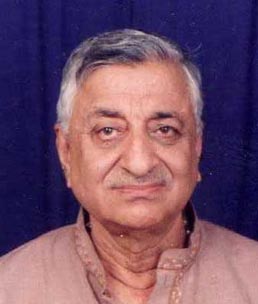


 is
a low cost proxy war declared by Pakistan against India to grab Kashmir.
The grimmest fallout of this atrocious Pak operation is the total exodus of the
Hindu minority from Kashmir Valley. It has threatened the unity of India and the
very survival of Kashmiri Hindu minority. They have been uprooted from Kashmir
Valley. The future is bleak and their existence is in danger. The following
census figures speak volumes:
is
a low cost proxy war declared by Pakistan against India to grab Kashmir.
The grimmest fallout of this atrocious Pak operation is the total exodus of the
Hindu minority from Kashmir Valley. It has threatened the unity of India and the
very survival of Kashmiri Hindu minority. They have been uprooted from Kashmir
Valley. The future is bleak and their existence is in danger. The following
census figures speak volumes:












No one has commented yet. Be the first!